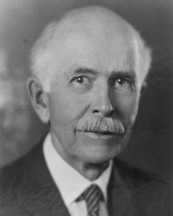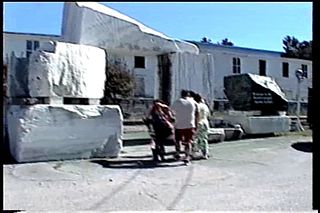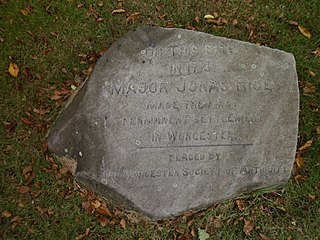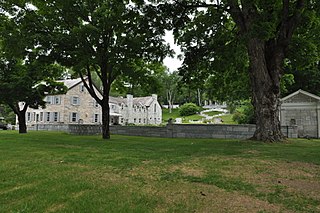
Henry Mower Rice was a fur trader and an American politician prominent in the statehood of Minnesota.

Rutland is a town in Rutland County, Vermont, United States. As of the 2020 census, the population was 3,924. Rutland Town completely surrounds Rutland City, which is a separate municipality. The villages of the town effectively comprise the inner suburbs of Rutland City.

West Rutland is a town in Rutland County, Vermont, United States. The population was 2,214 at the 2020 census. The town center, located in the south-central portion of the town and where about 87% of the population resides, is defined by the U.S. Census Bureau as a census-designated place (CDP). The town is part of the Rutland micropolitan NECTA.

Redfield Proctor was a U.S. politician of the Republican Party. He served as the 37th governor of Vermont from 1878 to 1880, as Secretary of War from 1889 to 1891, and as a United States Senator for Vermont from 1891 to 1908.

Edmund Rice was an American politician. Rice served in the U.S. Congress in Minnesota's 4th District from March 4, 1887, to March 3, 1889.

Frank C. Partridge was an American attorney, diplomat, and business executive from Vermont. A Republican, he served briefly in the United States Senate, appointed to fill the vacancy left by the death of Frank L. Greene.

William Upham was an American attorney and politician from Montpelier, Vermont. He was most notable for his service as a United States senator from Vermont.

The Vermont Marble Museum or Vermont Marble Exhibit is a museum commemorating the contributions of Vermont marble and the Vermont Marble Company, located in Proctor, Vermont, United States. The museum is located in a wing of one of the former Vermont Marble Company buildings.

Edmund Rice, was an early settler to Massachusetts Bay Colony born in Suffolk, England. He lived in Stanstead, Suffolk and Berkhamsted, Hertfordshire before sailing with his family to America. He landed in the Colony in summer or fall of 1638, thought to be first living in the town of Watertown, Massachusetts. Shortly thereafter he was a founder of Sudbury in 1638, and later in life was one of the thirteen petitioners for the founding of Marlborough in 1656. He was a deacon in the Puritan Church, and served in town politics as a selectman and judge. He also served five years as a member of the Great and General Court, the combined colonial legislature and judicial court of Massachusetts.
Levi Hubbard was a U.S. Representative from Massachusetts. Born in Worcester in the Province of Massachusetts Bay to Jonas Hubbard and Mary (Stevens) Hubbard, he attended the common schools. He moved to Paris in Massachusetts' District of Maine in 1785, where he farmed and served in local offices including selectman and treasurer of Oxford County.

Charles Austin Coolidge, Jr. was a United States Army soldier who served in the American Civil War, the American West, Spanish–American War, and in Asia before retiring in 1903 as a brigadier general.

Jonas Rice (1672–1753) was the first permanent settler of European descent in Worcester, Massachusetts, and was a founder and prominent citizen of the town. He was elected as a judge to the Court of Common Pleas in Worcester County, Massachusetts and he served until his death.

Herman Churchill (1869–1941) was an American historian and college professor. He served as the founding chairman of the History Department of Rhode Island State College, and was the namesake of the Herman Churchill Award for Excellence in History given annually to the top honors history student at the University of Rhode Island.

Horace Henry Baxter was a Vermont businessman who served as Adjutant General of Vermont at the start of the American Civil War. He became President of the New York Central Railroad and was one of the major shareholders with Cornelius Vanderbilt.

William Young Warren Ripley was a Union Army officer from Vermont in the American Civil War. He received the Medal of Honor for heroism at the Battle of Malvern Hill.

The Manley-Lefevre House is a historic house at 1161 Dorset West Road in Dorset, Vermont. Built out of marble about 1820 and sympathetically enlarged 1908–1927, it is the centerpiece of a 100-acre (40 ha) farm estate that is now home to the Marble House Project, an arts organization offering residencies. The property was added to the National Register of Historic Places in 1990.

The Proctor-Clement House is a historic house at 85 Field Avenue in Rutland, Vermont. It was built in 1867 for Redfield Proctor, a prominent local lawyer and businessman who came to own the Vermont Marble Company and served as Governor of Vermont. A fine example of Italianate architecture, it now houses the Antique Mansion Bed and Breakfast. It was listed on the National Register of Historic Places in 1982.
Frank H. Chapman was an American public official from Vermont. He served as Vermont's Deputy United States Marshal for more than 20 years (1901-1923), and was acting U.S. Marshal for Vermont for several days in 1903 following the removal of his predecessor.
















